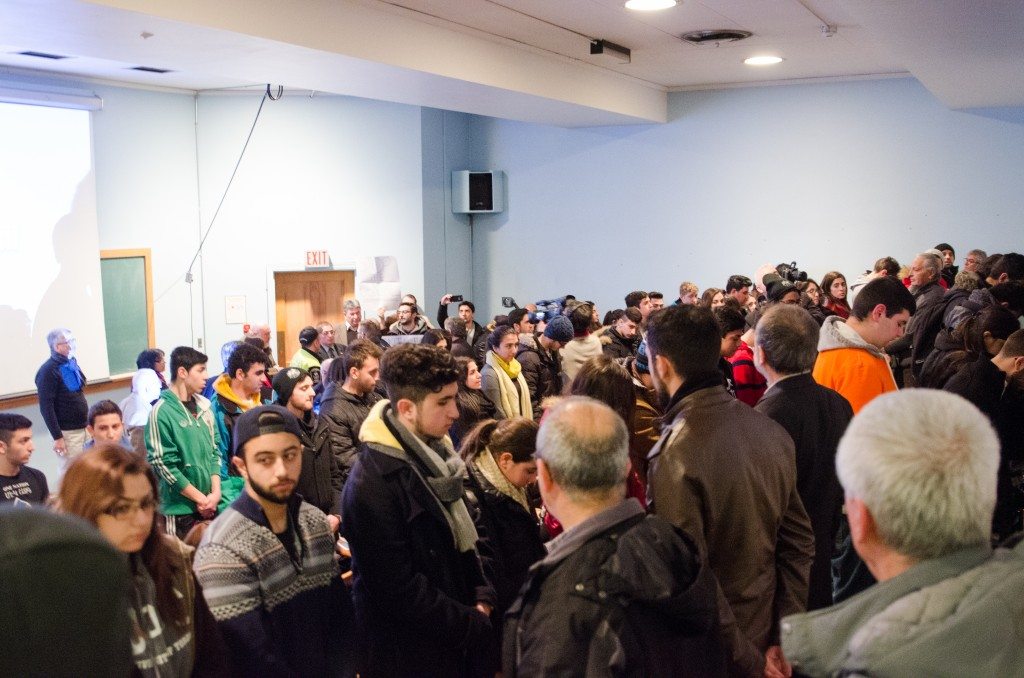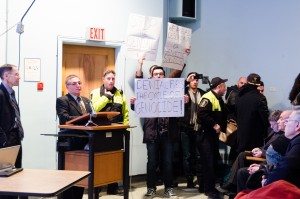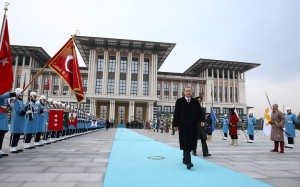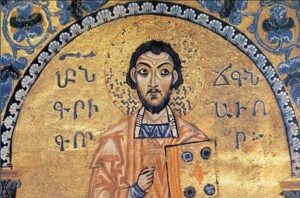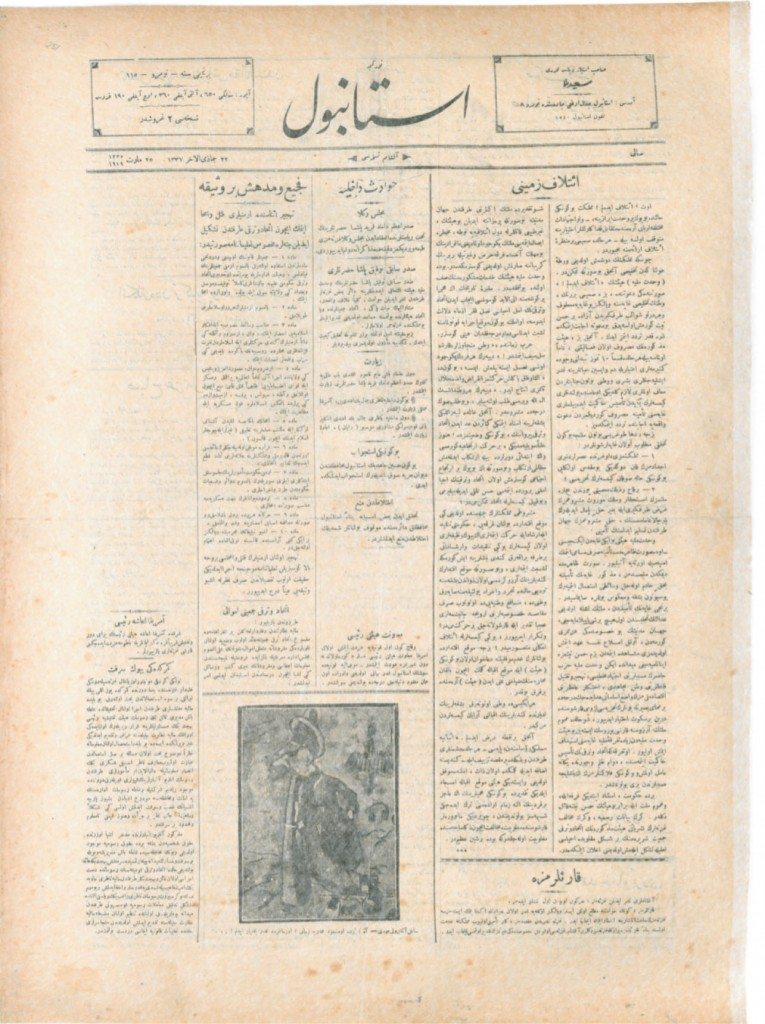Anti-Armenian banners celebrating the Armenian Genocide have been
displayed in cities around Turkey. Meanwhile, on Feb. 22, two protests
were held under the banner of “Demonstrations Condemning the Khojali
Genocide and Armenian Terror,” in the Kadikoy and Beyoglu districts in
Istanbul. Some protesters chanted anti-Armenian slogans, while others
invoked the name of Ogun Samast, the ultra-nationalist youth who gunned
down Agos Editor Hrant Dink in 2007.
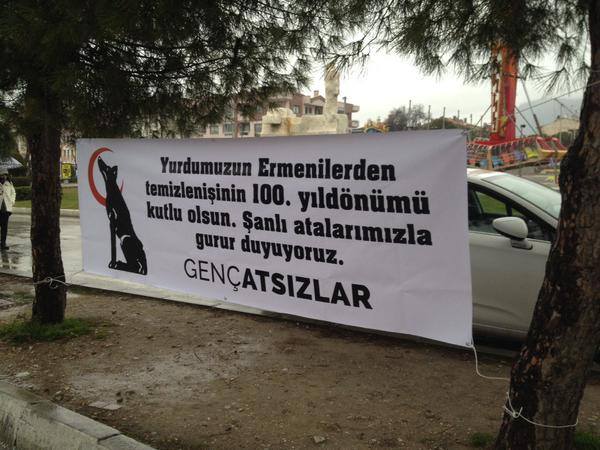
A
banner in the southwest province of Mugla reads, “We celebrate the
100th anniversary of our country being cleared of Armenians. We are
proud of our glorious ancestors. –Young Atsizs.” (Atsizs refers to Nihal
Atsiz, a leading ideologue of Turkish racism and a proponent of
Turanism).
The banners celebrating the Armenian Genocide were spotted in
different parts of the country. In the southwest province of Mugla, a
banner declared, “We celebrate the 100
th anniversary of our
country being cleared of Armenians. We are proud of our glorious
ancestors. –Young Atsizs.” Atsizs refers to Nihal Atsiz (1905-75), a
leading ideologue of Turkish racism and a proponent of Turanism. The
banner was displayed in front of the Provincial Directorate of Youth and
Sports in Mugla. The Directorate claimed the banner was hung far enough
that they had not seen it, but that “responsible citizens” had removed
it, according to Demokrat Haber.
Similar banners were also displayed in Manisa (north of Izmir), and
Ordu (on the Black Sea coast). Demokrat Haber also reports that similar
posters were put up by the Mayor’s office in Sogutlucesme, Istanbul, as
well as Marmara University’s Goztepe campus.
“The Human Rights Association can only attempt to raise a voice
protesting these initiatives. As long as the Turkish public is not
upset, and feels no shame by these demonstrations, the discourse, and
the slogans, there will be no real response to these rabid anti-Armenian
initiatives,” human rights activist Ayse Gunaysu told the Armenian
Weekly, adding, “This reality has been haunting me in recent days.”
Protests around Istanbul
In Kadikoy, an anonymous source observed around 1,000-1,500
protesters, many waving Azerbaijani flags. The source said aside from
nationalist slogans, and chants about the “Khojali genocide,”
anti-Kurdish slogans were also heard, presumably fueled by the recent
killing of an ultranationalist man who was partaking in an attack
against members of the pro-Kurdish People’s Democratic Party (HDP) in
Izmir. The anti-Armenian slogans were more muted than what had been
observed during the
Feb. 26, 2012 anti-Armenian protest, noted the source.
According to Gunaysu, a Weekly contributor, protesters might have
been deterred from chanting rabidly anti-Armenian slogans during the
latest rally due to the fact that those who had carried banners reading,
“You are all Armenians, you are all bastards,” in 2012, had been
sentenced to 5 months in prison, which was later turned to a 3,000 TL
fine by the court.
The police were present in large numbers in Kadikoy, and blocked
movement to main streets, including near the offices of the pro-Kurdish
People’s Democratic Party (HDP).
According to Demokrat Haber, buses transported protesters—free of
charge—from in front of the governorates of surrounding cities to where
the Kadikoy demonstration was being held.
In the days leading up to the protest, the Human Rights Association (HRA) of Turkey’s Istanbul branch
issued a statement condemning the protest, calling it a “pretext to incite ethnic hate against Armenians in Turkey.”
The organization also petitioned the Istanbul Governorate, warning
officials of the anti-Armenian sentiments that were on the rise ahead of
the planned protest.
According to Demokrat Haber, despite the fact that the protest
organizers had claimed to have the proper permits to stage the rally,
the Istanbul Governorate had not been notified about the demonstration,
and had not received any permit applications. Furthermore, official
sources held that in keeping in line with clause 6 of the “Law on
Rallies and Demonstration Marches,” permits could not have been granted
for the location of the rally, since the area is off limits as a public
gathering space.
Similarly, the HRA received a fax from the Governorate of Istanbul,
stating that their office neither received a request for permission for
the protests, nor granted any such permission.
Meanwhile, according to a source, the Association of Reformist Youth
of Azerbaijan has denied involvement in these protests. Earlier the HRA
had reported that the protests were being organized by the Association
of Reformist Youth of Azerbaijan, together with the Turkish Hearths
Youth branches and the Turanist Movement Platform.
In Galatasaray Square in Beyoglu, a smaller protest was held with
participants from the Nationalist Turkey Party and the Turan Hearths.
According to the Turkish news outlet Haberler, the protesters shouted
slogans against Armenia; calling Khojali a “part of the homeland” that
was “under Armenian invasion.” The protesters also condemned the
international community for supporting Armenia. Minor clashes with the
police were reported.
The Feb. 20 HRA statement cautioned that anti-Armenian sentiments
were on the rise, and that racist graffiti had been spray painted on and
near churches, with messages such as, “You are all Armenians, you are
all bastards.”
The HRA statement added, “You, officials who refrain from
criminalizing racist slogans on church walls, who officially or
unofficially permit protests and demonstrations preannounced by such
slogans, if you do not enforce the law, you will become partners in the
crime…”
Ayse Gunaysu and Burcu Gursel contributed to this report.
